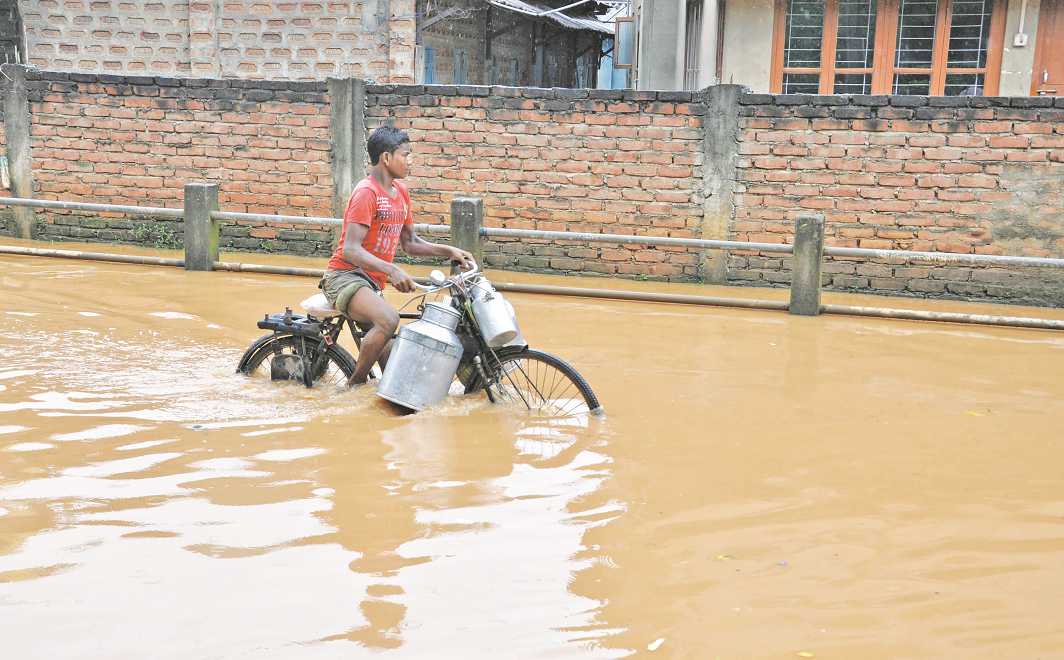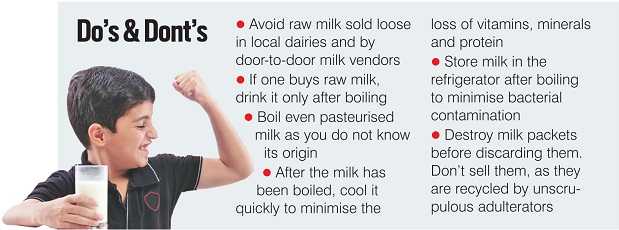Aug 18, 2017
Food Adulteration: The Muck in Milk
Even as the apex court had directed the government to amend the Food Safety and Standards Act and IPC to award life imprisonment for milk adulterators, studies have found the presence of coliform bacteria in it~By Ramesh Menon
Some things do not change in India. Like the adulteration of milk. First it was done with plain water, then it was chemicals that included detergent. And now a study done by the Consumer Education and Research Centre (CERC) at Ahmedabad has found that 70 percent of loose milk sold is unfit for human consumption. Out of 55 loose milk samples tested, 38 were found to contain coliform bacteria indicating faecal contamination. This could be due to milch cattle not being washed properly, leading to dung falling into the milk vessel. It could also be due to contaminated water being used to adulterate the milk.
DAMAGING EFFECTS
Coliform bacteria can cause diarrhoea, vomiting, urinary tract infections and typhoid. Unless boiled or pasteurised, milk in the raw form can be dangerous. Thirty-one of the 55 samples tested were graded fair to poor in tests that measured contamination by bacteria which can cause gastroenteritis, food poisoning and intestinal irritation.
Milk adulteration has been going on for a long time. In 2014, the UP government in a startling admission told the Supreme Court that adulteration of milk was rampant in the state. Vijay Bahadur, assistant commissioner (food safety), Uttar Pradesh Food Safety and Drug Authority, said the menace was most rampant during festival seasons when the demand for milk rises.
In an affidavit, the UP government admitted that it had actually failed to take effective steps to curb it. It pointed out that out of the 4,503 samples collected between January 2012 and May 2013, 1,280 were found to be adulterated with detergent, starch, carbohydrate and whitener. Another sample size of 613 found that 207 samples were adulterated. The worst cases of adulteration were from Faizabad, Moradabad, Agra and Saharanpur.
Last year, the Bombay High Court took note of milk adulteration and directed the Maharashtra government and the Commissioner of Food and Drugs Administration to spell out how it planned to deal with this as the health of the public and children was at risk.
UNHYGIENIC HANDLING
Incidentally, due to its high nutritive value and moisture content, milk is an excellent medium for the growth of microorganisms. Microbial content in it depends on the living conditions and hygiene in sheds of milch cattle and the cleanliness of those milking them, the animals and vessels. Once micro-organisms enter milk, they multiply due to the warm ambient temperature, resulting in rapid deterioration. As there are no regulations on hygiene in barns, cleanliness is given the go-by.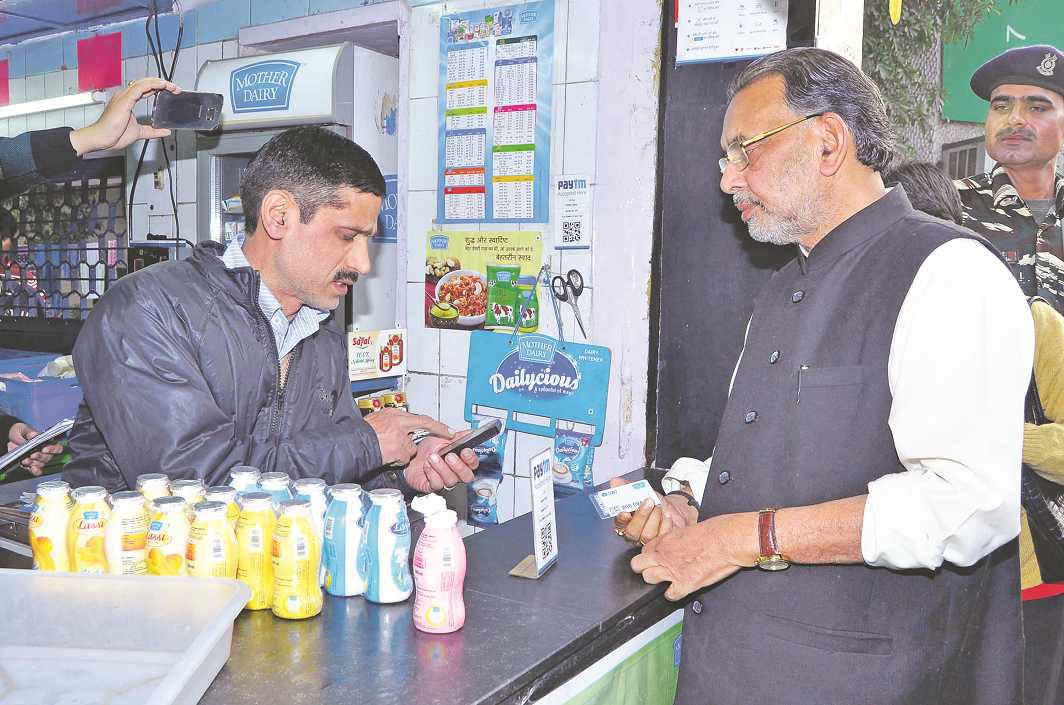

Union Minister of Agriculture and Farmers Welfare, Radha Mohan Singh, visits Mother Dairy Milk outlets in Delhi.
Pritee Shah, chief general manager, CERC, Ahmedabad, told India Legal: “Milch cattle eat garbage and plastic instead of nutritious fodder. There is lack of hygiene while milking, collection, storage and distribution of milk. You can’t trust local doodhwallas to adhere to safety standards. Today, it is vital to buy only packed and pasteurised milk.”
India is not only the largest producer but also the largest consumer of milk in the world. The organised dairy sector pasteurises and packs only 25-30 percent of milk. The remaining is either locally consumed or handled by the unorganised sector in an unhygienic manner.
HAZARDOUS ADULTERANTS
A 2016 study in Mirzapur, UP, of milk adulteration done by Pooja Jaiswal of Benaras Hindu University and SK Goyal, assistant professor, KVK Institute of Agricultural Sciences, Mirzapur, showed that 20 percent of milk samples contained urea, 44 percent had salt and 36 percent, soap. As many as 42 percent of the samples were found to contain skimmed milk powder to increase the weight or relative mass of natural milk, while ten percent were found to contain glucose to prolong the keeping quality of milk. Formalin was also found in 36 percent for the same reason.
Another study done by Maitreyi College in Delhi that tested 75 milk samples from Delhi, Faridabad, Gurgaon and Noida found that most of them had neutralisers, skimmed milk powder, urea, detergent and ammonium sulphate. Neutralisers are usually added to prevent curdling and increase the shelf-life of milk. They could be added in the form of caustic soda, sodium bicarbonate and sodium carbonate. Skimmed milk power was found in all the samples.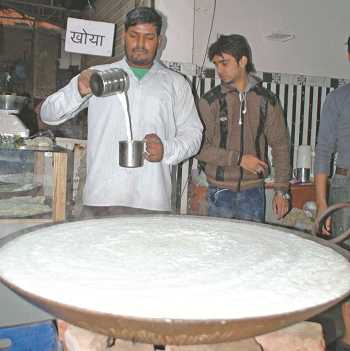

A local shop in Delhi selling milk-made products.
In 2011, the “Executive Summary on National Survey on Milk Adulteration” released by the Foods Safety and Standards Authority of India (FSSAI) pointed out that at the national level, 68.4 percent of milk being sold was adulterated. It said the worst performers were Bihar, Chhattisgarh, Odisha, West Bengal, Mizoram, Jharkhand and Daman and Diu, where adulteration in milk was found up to 100 percent! This Authority was established under the Food Safety and Standards Act (FSSA), 2006. The Act not only replaces the Prevention of Food Adulteration Act 1954 but also consolidates other food acts such as the Fruits Product Order, Meat Food Products Order, Vegetable Oil Products (control) Order and the Milk and Milk Products order.
So how can this menace be curbed? Ashish Bahuguna, chairman of the FSSAI, said that milk adulteration is more in North India than the South. A kit has been produced to check the quality of milk by FSSAI. It is presently negotiating with investors and entrepreneurs to mass produce and market it.
LIFE IMPRISONMENT
A year ago, a Supreme Court bench had asked both the centre and the states to look at amending the FSSA and also the IPC so that those who adulterate milk can be awarded life imprisonment. Referring to its orders of December 5, 2013 and December 10, 2014, the apex court said: “It will be in order, if the Union of India considers making suitable amendments in the penal provisions at par with the provisions contained in the State amendments to the Indian Penal Code” by Uttar Pradesh, West Bengal and Odisha governments, which have enhanced the punishment for adulteration of food and products to life imprisonment.
Speaking for the bench, Justice R Banumathi had said: “Since in India traditionally infants and children are fed milk, adulteration of milk and its products is a concern and stringent measures need to be taken to combat it. The consumption of adulterated milk and adulterated milk products is hazardous to human health.”
Coliform bacteria can cause diarrhoea, vomiting, urinary tract infections and typhoid. Unless boiled or pasteurised, milk in the raw form can be dangerous.
The direction by the apex court to make milk adulteration punishable with life imprisonment came after a PIL was filed by an Uttarakhand-based religious seer Swami Achyutanand Tirth. He had highlighted the menace of growing sales of adulterated and synthetic milk in different parts of the country.
Last year, Harsh Vardhan, the science and technology minister told the Lok Sabha that over 68 percent of milk in the country does not conform to standards laid down by the food regulator. He added that the most common adulterants found in milk were detergent, caustic soda, glucose, white paint and refined oil, considered “very hazardous” as it could lead to serious ailments.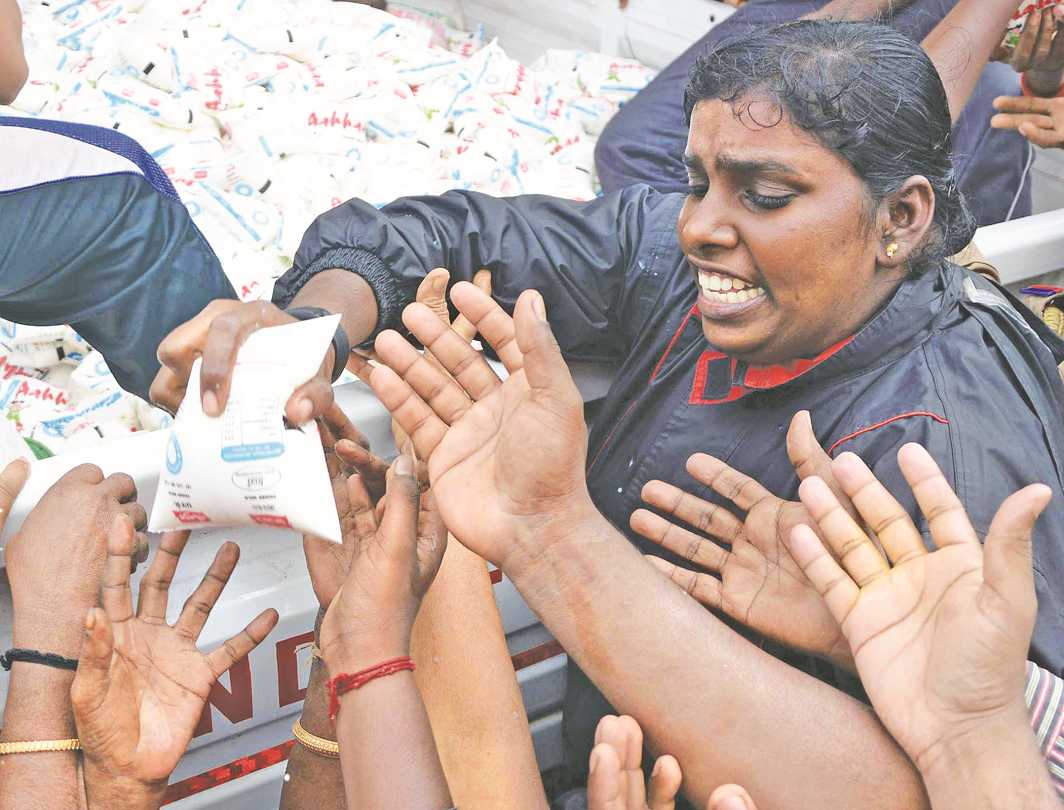

Milk sold in packets is more hygienic than milk sold raw.
In olden days, there were no pasteurisation units and the milkman supplied the milk. But then cattle grazed in lush green fields, were healthy and well-fed. Today, milch animals are just seen as vehicles to make money. They live in cramped sheds that are dirty, full of dung and urine and are let out into the open, where they feed mainly on waste found in polythene bags. As there is no law on hygiene and cleanliness, the local milkman does not want to incur extra costs to ensure that the milk is unadulterated.
But with reports of coliform in it, there are enough reasons to worry.
Misleading to call soya, almond beverages ‘milk’, says Parag Foods
“Only milk obtained from milch animals can be called milk. Soya/badam drinks can only be called as substitute of milk or alternative to milk, but they cannot be termed as milk”
NEW DELHI, AUGUST 17:
Dairy company Parag Milk Foods has raised concerns on plant-based soy or almond-based beverage makers classifying their product as milk.
Devendra Shah, Chairman, Parag Milk Foods, said: “According to the regulations, only milk obtained from milch animals can be defined as milk”. He added that as per the regulations, even toned milk or full-cream milk should be made out of milk or milk products obtained exclusively from animal-sourced milk and should not contain any other substances.
“One can’t promote soy and almond milk, the same as milk , in contravention of the provisions of food safety law. Therefore, the association of the word ‘milk’ with soya or almond beverages is quite misleading and should not be permitted to be sold as soya or almond Milk,” he added.
In a letter to the Food Safety and Standards Authority of India, the company has said that under the FSS Act and Regulations, beverages having vegetable plant origin and having milky appearance sourced from soyabean and almond cannot be termed as milk.
“Manufacturing and selling of soya/badam beverage as soya/badam milk is misleading. These drinks can only be called as substitute of milk or alternative to milk, but they cannot be termed as milk as per Food Safety and Standards ( Food products and Food Additives) Regulations 2011,” the letter stated.
Non-milk alternatives
According to Euromonitor, non-dairy milk alternatives in India are still in the nascent stage and have pegged the retail value sales of soy milk currently at about ₹106 crore. The category is expected to grow at 15.7 per cent CAGR in the country in 2017-2022 period, it said.
This concern comes at a time when a similar debate has been raised in more developed markets of Soy Milk such as the United States. According to media reports, traditional dairy companies and makers of plant-based alternatives are locked in a battle over labelling norms of plant-based alternatives in the US since the beginning of this year.
Ashwin Bhadri, CEO, Equinox Labs, said: “ For more clarity for consumers, additional disclaimer such as “non-dairy milk” can be put on the labels of such products. It becomes a bigger concern, if someone is marketing flavoured milk as almond milk or soy milk.”
Abbott increases nutrition portfolio for metabolic disorders
Abbott, a leader in nutrition science research and development, has announced increased access to its metabolic formulas to help infants diagnosed with Inborn Errors of Metabolism (IEM) in India.
Abbott's Nutrition Metabolic Formulas (ANMF) will help infants diagnosed with IEM in India, where the US-based company said, a large number of babies need specialised nutrition and medical attention to survive.
The announcement comes on the back of easing of import regulations by the regulatory authority FSSAI (Food Safety and Standards Authority of India) under the Diet4Life initiative, which has made the movement of these critical medical foods simpler and faster into the country since November 2016.
The final approval on IEM products came in June.
India has one of the world's highest birth rates. Of the nearly 74,000 babies born every day, 74 are likely to born with IEM, the global healthcare company said.
On a yearly basis, this translates into more than 27,000 infants who need specialised nutrition and medical attention to be able to stay healthy and even survive, it said.
Anganwadis serve poor quality dal in Guntur
Mr Pulla Rao with food safety department officials conducted surprise checks in the Rythu Bazaar near NTR bus station.
Minister P. Pulla Rao, along with other officials, inspects and tastes food at an Anganwadi centre in Srinivasa Raothota in Guntur on Thursday.
Guntur: Minister for civil supplies P. Pulla Rao expressed displeasure with the officials for using poor quality dal in the food being served at Anganwadi centres, during his inspection in Guntur on Thursday.
He warned the officials about stern action if they fail to follow the norms. He inspected the rooms, food and kitchen in the Anganwadi center at Srinivas rao Thota and inquired about the nutritious food offered to pregnant women under Anna Amrutha Hastham scheme. He tasted the food with Guntur joint collector Krithika Shukla and Guntur West MLA M Venugopala Reddy and expressed dissatisfaction over the poor quality of dal and rice. He directed the officials and Anganwadi centers to provide nutritious food and warned of stern actions for violation of norms.
Mr Pulla Rao with food safety department officials conducted surprise checks in the Rythu Bazaar near NTR bus station. He expressed anguish over the poor sanitation and selling of water and food for excess prices in the food canteen in the Rythu Bazaar. He directed food safety department to collect samples for tests. He interacted with the public, inquired about the rates of vegetable and stated the government is taking all measures to control onion prices. He directed Estate Officer to take measures for the improving sanitation.
Subscribe to:
Comments (Atom)

